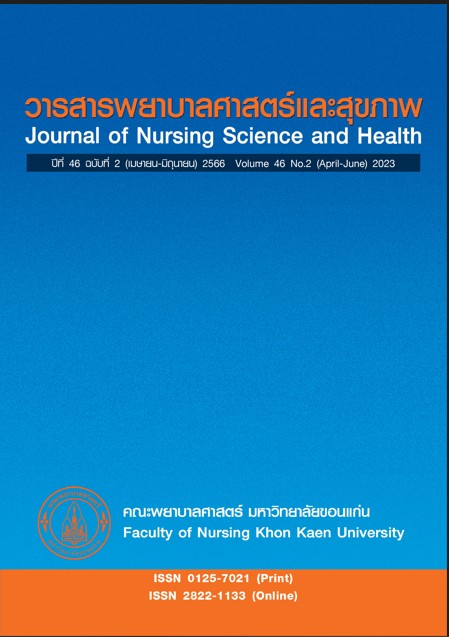ผลของโปรแกรมการให้ความรู้ในการช่วยฟื้นคืนชีพขั้นพื้นฐานต่อความรู้และทักษะ การช่วยฟื้นคืนชีพขั้นพื้นฐานของนักศึกษาพยาบาล มหาวิทยาลัยเอกชนแห่งหนึ่ง
คำสำคัญ:
การช่วยพื้นคืนชีพขั้นพื้นฐาน, ความรู้, ทักษะ, นักศึกษาพยาบาลบทคัดย่อ
การวิจัยกึ่งทดลองแบบสองกลุ่มวัดผลก่อนหลังนี้ มีวัตถุประสงค์เพื่อศึกษาผลของโปรแกรมการให้ความรู้ในการช่วยฟื้นคืนชีพขั้นพื้นฐานต่อความรู้และทักษะการช่วยฟื้นคืนชีพขั้นพื้นฐานของนักศึกษาพยาบาล กลุ่มตัวอย่างเป็นนักศึกษาพยาบาลชั้นปีที่ 2 ปีการศึกษา 2565 มหาวิทยาลัยเอกชนแห่งหนึ่ง แบ่งเข้ากลุ่มควบคุมและกลุ่มทดลอง กลุ่มละ 30 คน โดยที่กลุ่มทดลองได้รับโปรแกรมการให้ความรู้ในการช่วยฟื้นคืนชีพขั้นพื้นฐาน ประกอบด้วย การบรรยาย คลิปวิดีโอ คู่มือการช่วยฟื้นคืนชีพขั้นพื้นฐาน และสถานการณ์จำลอง กลุ่มควบคุมได้รับการจัดการเรียนการสอนแบบปกติ เครื่องมือที่ใช้ คือ แบบวัดความรู้เรื่องการช่วยฟื้นคืนชีพขั้นพื้นฐานที่มีค่าความเชื่อมั่นของคูเดอร์ริชาร์ดสัน (KR20) เท่ากับ 0.72 และแบบประเมินทักษะการช่วยพื้นคืนชีพขั้นพื้นฐานที่มีการตรวจสอบค่าความเชื่อมั่นของเครื่องมือได้ค่าสัมประสิทธิ์แอลฟ่าของครอนบาค เท่ากับ 0.96 วิเคราะห์ข้อมูลทั่วไปโดยใช้สถิติบรรยาย ตรวจสอบการกระจายของข้อมูลโดยใช้สถิติ Kolmogorov-Smirnov test พบว่า ข้อมูลทั้งหมดมีการแจกแจงแบบโค้งปกติ จึงเปรียบเทียบคะแนนภายในกลุ่มและระหว่างกลุ่มโดยใช้สถิติการทดสอบ Paired sample t-test และสถิติการทดสอบ Independent sample t-test ตามลำดับ
ผลการวิจัยพบว่า หลังการทดลองคะแนนเฉลี่ยความรู้และทักษะการช่วยฟื้นคืนชีพขั้นพื้นฐานของนักศึกษากลุ่มทดลองสูงกว่าก่อนทดลองอย่างมีนัยสำคัญทางสถิติที่ระดับ .05 และคะแนนเฉลี่ยทักษะการช่วยฟื้นคืนชีพขั้นพื้นฐานของกลุ่มทดลองสูงกว่ากลุ่มควบคุมอย่างมีนัยสำคัญทางสถิติที่ระดับ .05 แต่คะแนนเฉลี่ยความรู้ของกลุ่มทดลองไม่แตกต่างจากกลุ่มควบคุม ถึงแม้ว่าคะแนนเฉลี่ยความรู้ของทั้งสองกลุ่มไม่แตกต่างกันแต่คะแนนเฉลี่ยทักษะของกลุ่มทดลองที่ได้รับโปรแกรมการให้ความรู้ในการช่วยฟื้นคืนชีพขั้นพื้นฐานสูงกว่ากลุ่มควบคุมที่ได้รับการจัดการเรียนการสอนแบบปกติ จากผลการศึกษานี้แสดงให้เห็นว่าโปรแกรมการให้ความรู้ในการช่วยฟื้นคืนชีพขั้นพื้นฐานมีความเหมาะสมในการนำไปใช้มากกว่าการเรียนการสอนของนักศึกษาพยาบาลในรูปแบบเดิม
เอกสารอ้างอิง
Wong CX, Brown A, Lau DH, Chugh SS, Albert CM, Kalman JM, et al. Epidemiology of sudden cardiac death: Global and regional perspectives. Heart Lung Circ 2019;28(1):6-14.
Graham R, McCoy MA, Schultz AM. Strategies to improve cardiac arrest survival: A time to act. Washington DC: The National Academies Press; 2015.
Olasveengen TM, Semeraro F, Ristagno G, Castren M. Handley A, Kuzovlev A, et al. European resuscitation council guidelines 2021: Basic life support. Resuscitation 2021;161:98-114.
Relief and Community Health Bureau, The Thai Red Cross Society. Emergency first aid and basic CPR. Bangkok: New Thammada Press; 2020. (in Thai)
Kiguchi T, Okubo M, Nishiyama C, Maconochie I, Ong MEH, Kern KB, et al. Out-of-hospital cardiac arrest across the world: First report from the International Liaison Committee on Resuscitation (ILCOR). Resuscitation 2010;152:39-49.
Kim SH, Issenberg B, Roh YS. The effects of simulation-based advanced life support education for nursing students. Comput Inform Nurs 2020;38(5):240-5.
Cortegiani A, Baldi E, Iozzo P, Vitale F, Raineri SM, Giarratano A. Real-time feedback systems for cardiopulmonary resuscitation training: Time for a paradigm shift. J Thorac Dis 2018;10(2): E162.
Lin Y, Cheng A, Grant VJ, Currie GR, Hecker KG. Improving CPR quality with distributed practice and real-time feedback in pediatric healthcare providers–a randomized controlled trial. Resuscitation 2018;130:6-12.
McCoy CE, Rahman A, Rendon JC, Anderson CL, Langdorf MI, Lotfipour S, et al. Randomized controlled trial of simulation vs. standard training for teaching medical students high-quality cardiopulmonary resuscitation. West J Emerg Med 2019; 20(1):15.
Daya MR, Schmicker RH, Zive DM, Rea TD, Nichol G, Buick JE, et al. Out-of-hospital cardiac arrest survival improving over time: results from the Resuscitation Outcomes Consortium (ROC). Resuscitation 2015;91:108-15.
The Heart Association of Thailand under the Royal Patronage of HM the King. Basic life support and automatic external defibrillators (AED) for the public handbook 2018. Bangkok: Phanyamit Printing; 2018. (in Thai)
Bandura A. Social learning theory. New Jersey: Prentice Hall; 1987.
Tantasirin K, Partiprajak S, Piasue N. Effectiveness of basis life support retraining program on knowledge and chest compression performance in basic life support among new registered nurses. Thai Journal of Nursing 2019;68(3):21-9. (in Thai)
Lemeshow S, Hosmer D, Kler J, Lwanga S. Adequacy of sample size in health studies. Chichester: Jonh Wiley & Son; 1992.
Norkaeo D, Treenon P, Chabuakam N, Kanbupar N, Teanthong S, Kaewmanee C. Nursing students knowledge and skills about basic life support (BLS): The effects of simulation-based learning. The Southern College Network Journal of Nursing and Public Health 2018;5(3):84-95. (in Thai)
Pangsuk P, Kingmala C. The effect of simulation-based learning on knowledge and self-efficacy of the third-year nursing students in caring for emergency patients. Songklanagarind Journal of Nursing 2021;41(2):89-100. (in Thai)
Demirtas A, Basak T, Sahin G, Sonkaya MÇ. The serious game and integrated simulator for cardiopulmonary resuscitation training in nursing students. Simulation & Gaming 2022;53(2):97-110.
Sinthuchai S, Ubolwan K, Boonsin S. Effects of high-fidelity simulation based learning knowledge, satisfaction, and self-confidence among the fourth tear nursing students in comprehensive nursing care practicum. Ramathibodi nursing Journal 2017;23(1):113-27. (in Thai)
Ninwatcharamanee C, Dhabdhimsri V, Somboon P. Effects of providing knowledge and skills for cardiopulmonary resuscitation of nursing students, Boromarajonani College of Nursing, Bangkok. Journal of Health and Nursing Research 2021;37(1):180-92. (in Thai)
Ruangrit R, Keawpimon P, Sengloiluean K. Knowledge, skills and self-confidence in basic life support and automated external defibrillator (AED) using among under graduated nursing students. Princess of Naradhiwas University Journal 2021;13(2):125-41. (in Thai)
ดาวน์โหลด
เผยแพร่แล้ว
รูปแบบการอ้างอิง
ฉบับ
ประเภทบทความ
สัญญาอนุญาต
ลิขสิทธิ์ (c) 2023 วารสารพยาบาลศาสตร์และสุขภาพ

อนุญาตภายใต้เงื่อนไข Creative Commons Attribution-NonCommercial-NoDerivatives 4.0 International License.
วารสารพยาบาลศาสตร์และสุขภาพเป็นเจ้าของลิขสิทธิ์ในการเผยแพร่ผลงานที่ตีพิมพ์ห้ามผู้ใดนำบทความที่ได้รับการตีพิมพ์ในวารสารพยาบาลศาสตร์และสุขภาพไปเผยแพร่ในลักษณะต่าง ๆ ดังนี้ การนำบทความไปเผยแพร่ออนไลน์ การถ่ายเอกสารบทความเพื่อกิจกรรมที่ไม่ใช่การเรียนการสอน การส่งบทความไปตีพิมพ์เผยแพร่ที่อื่น ยกเว้นเสียแต่ได้รับอนุญาตจากวารสารพยาบาลศาสตร์และสุขภาพ



